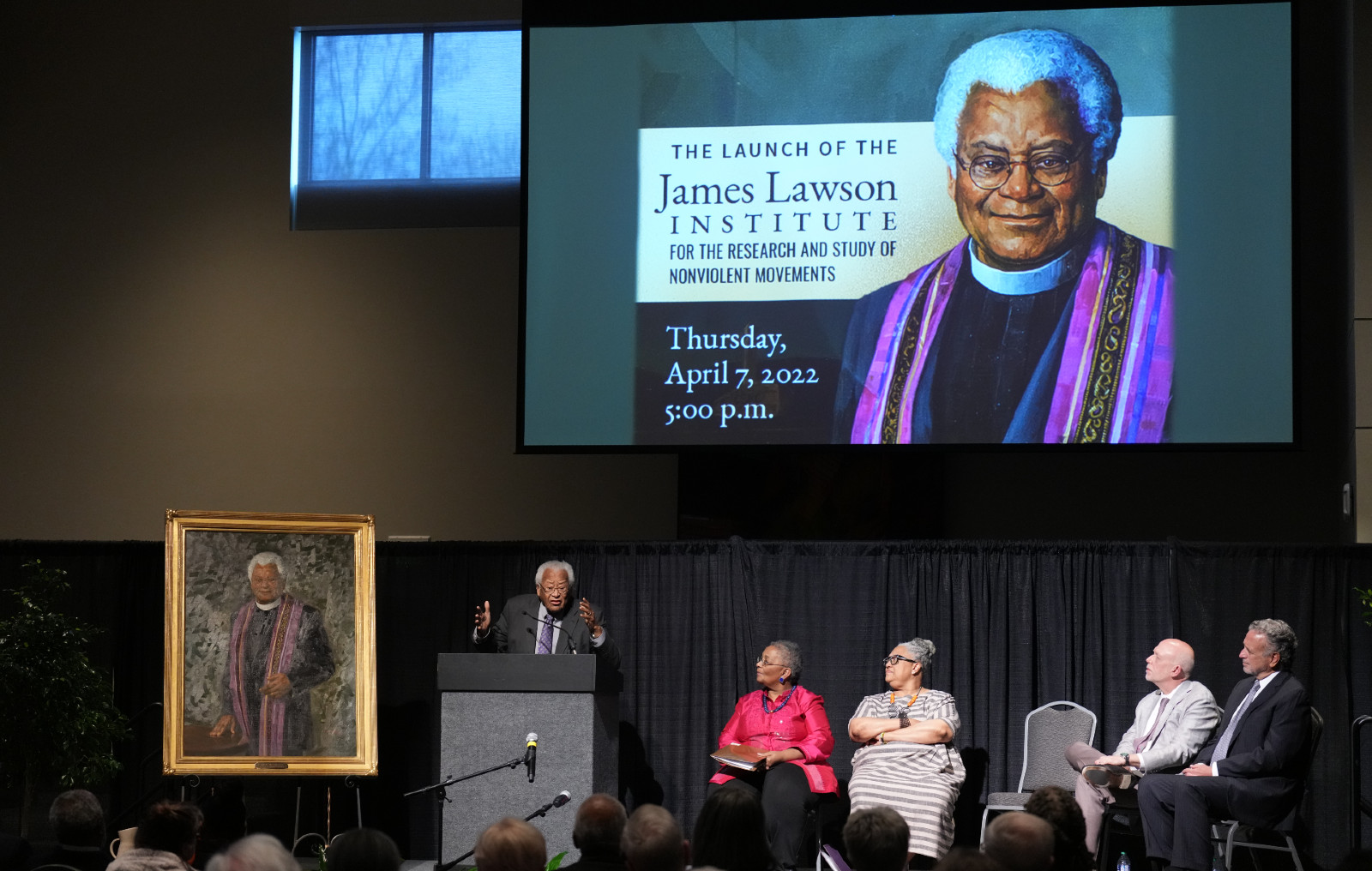by Ann Marie Deer Owens
The Rev. James Lawson returned to Vanderbilt University for the April 7 launch of an institute that carries forward his commitment to achieving justice and equality through nonviolent movements and strategies.
“This institute will help Vanderbilt ‘be on the map around the world’ for the kind of social change—personal and social transformation—that will save the race, the human race, that is, and save the times in which we live,” Lawson said. “We do no ordinary thing here. We are not engaged in something that we can see, but the possibilities are infinite. I’m so grateful for this moment.”
The James Lawson Institute for the Research and Study of Nonviolent Movements, a trans-institutional collaboration between the Divinity School and the College of Arts and Science, will advance evidence-based research and nonviolent change while preparing the next generation of leaders, humanitarians and community organizers. Lawson, one of Vanderbilt’s most revered alumni, played an influential role in the peaceful protests of segregation during the 1960s by training Nashville college students in the principles of nonviolent change.
Watch: The launch of the James Lawson Institute for the Research and Study of Nonviolent Movements
Chancellor Daniel Diermeier paid tribute to Lawson’s profound and ongoing legacy in his opening remarks Thursday at the Student Life Center. “For more than four decades, James Lawson has brought the same moral courage and nonviolent strategies to bring about positive changes for workers, immigrants, women and members of the LGBTQ community,” Diermeier said. “He remains an unstoppable advocate for justice and a more perfect union. He continues to entreat us to engage with one another in a message of love—not hate. And he creates opportunities where we can cherish our common humanity in a time of deep polarization. At a time when these virtues are often overlooked or deliberately ignored, his message carries particular weight, inspiring others to follow in his footsteps.”
John M. Seigenthaler, who has strong historical ties to Lawson through his father, the late John L. Seigenthaler, delivered keynote remarks. “The Rev. Lawson was the architect, the father, of the nonviolent movement in this country. With students from Fisk, Tennessee State University and American Baptist Theological Seminary, he believed he could make a difference—and he did,” Seigenthaler said. “He taught those students about the philosophy of nonviolent protests, and he had students practice and prepare for the sit-ins. They acted out what it would be like, before they went, to be humiliated, beaten, pushed around when they sat in at lunch counters. In many ways, he was teaching them about turning the other cheek. That’s what Jim Lawson did in protests. He turned the other cheek, and that’s what he taught the students to do—reject hate and disarm the assailants with love. A revolutionary concept, a radical concept.”
Seigenthaler urged the audience to help make sure the real history of the movement is told. “We are in the presence of a man who has changed the world,” he said.
C. Cybele Raver, provost and vice chancellor for academic affairs, noted that Lawson’s teachings on the power of nonviolent movements hold particular impact for current times. “I think back to the summer of 2020 when hundreds of thousands of Americans and people all around the world were gathered in nonviolent resistance in response to the injustices done to George Floyd,” Raver said. “Research shows that 93 percent of the nearly 8,000 racial justice protests that summer remained nonviolent. And I think it’s because Reverend Lawson communicates so profoundly what we understand in our hearts as well as what we understand from our scholarship. Nonviolent protest is essentially not an expression of anger—although people can be angry—but an expression of hope in a belief that there is opportunity and progress to be made when we lift our voices together.”
Lawson expressed deep gratitude for Vanderbilt’s establishment of the institute and the leadership of those involved in the launch, including Emilie Townes, dean of the Divinity School and Distinguished Professor of Womanist Ethics and Society; Phillis Sheppard, the institute’s director and E. Rhodes and Leona B. Carpenter Professor; and John Geer, Ginny and Conner Searcy Dean of the College of Arts and Science.





